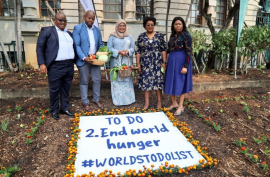
Human Settlements Minister, Mmamoloko Kubayi, says it is becoming increasingly urgent to move with speed in the implementation of the Sustainable Development Goals (SDGs) and New Urban Agenda, both of which will contribute to the creation of stable and prosperous societies throughout the world.
The Minister on Thursday hosted the Executive Director of UN-Habitat, Maimunah Mohd Sharif, who is on an official visit to South Africa from 12 - 17 October. The Executive Director’s visit will include the launch of the Global Action Plan Framework on Informal Settlements and Slums.
The framework is aimed at accelerating the SDGs and New Urban Agenda, while searching for solutions in response to the challenges of informal settlements and slums.
South Africa has placed informal settlement upgrading as a pivotal focal point for the creation of sustainable human settlements in urban centres. This, Kubayi said, is in line with SDG 11, which is to make cities and human settlements inclusive, safe, resilient and sustainable. It also ties in with the sections in the New Urban Agenda, which deal with informal settlements and slums.
“We have also adopted the development of integrated human settlements as a guiding policy response to address historical exclusionary spatial arrangements of the apartheid era.
“This policy seeks to transform the spatial housing settlements in South Africa by creating more inclusive, denser, mixed‐use urban areas,” Kubayi said.
While collaboration with UN-Habitat has yielded tangible results, Kubayi said it has been ad hoc and limited in scope and impact.
“The desire in government and UN-Habitat to have a more comprehensive but focused and impactful collaboration resulted in the process of developing a Collaboration Framework, which began shortly after Habitat III.
“The purpose of this Collaboration Framework is to jointly establish a firm base between South Africa and UN-Habitat to work towards achieving South Africa’s aspiration for sustainable urban development, set in NDP [National Development Plan] 2030,” the Minister said.
South Africa and UN-Habitat intend to enter into a Memorandum of Understanding, which commits them to jointly prepare a proposal for a deeper partnership between them.
“We are also working towards getting the necessary government approvals, so that UN-Habitat can set up an office here in South Africa as soon as next year,” said Kubayi.
The partnership will include the following areas of collaboration:
- Improving living conditions of communities living in informal settlements through accelerating informal settlements transformation in an inclusive and participatory manner.
- Area-based approach to crime and violence prevention (including through municipal structures and capacity building for community engagements).
- Improving accountability and fortifying municipal governance, and improving access to financing.
- Urban monitoring system that factors diversity of cities and urban areas, including smart cities.
- Built urban and community resilience to address social, physical, economic and environmental vulnerabilities and reduce risks of disasters and effects of climate change through an integrated planning approach (aligned to District Development Model).
During the visit, Sharif and Kubayi will hold bilateral discussions on strategic partnerships and country programmes, and sign a MOU between South Africa and UN-Habitat, among others.
From 13 to 16 October 2022, together with the South African delegation, Kubayi and Sharif will visit KwaZulu-Natal, Western Cape and Gauteng to assess the work that is being done to upgrade informal settlements through the provision of basic services and transfer of people to permanent housing structures.
The formal and informal settlements to be visited include Pemilton in Durban, Bosasa and Conradie Park in Cape Town, and Rugby Club and Fleurhof housing development in Roodepoort, Johannesburg. – SAnews.gov.za


